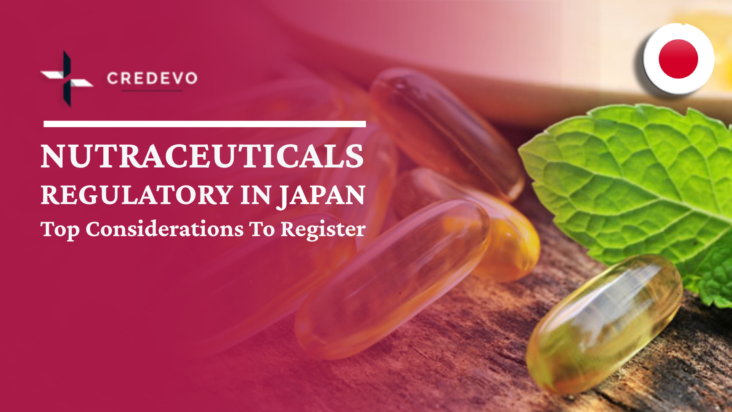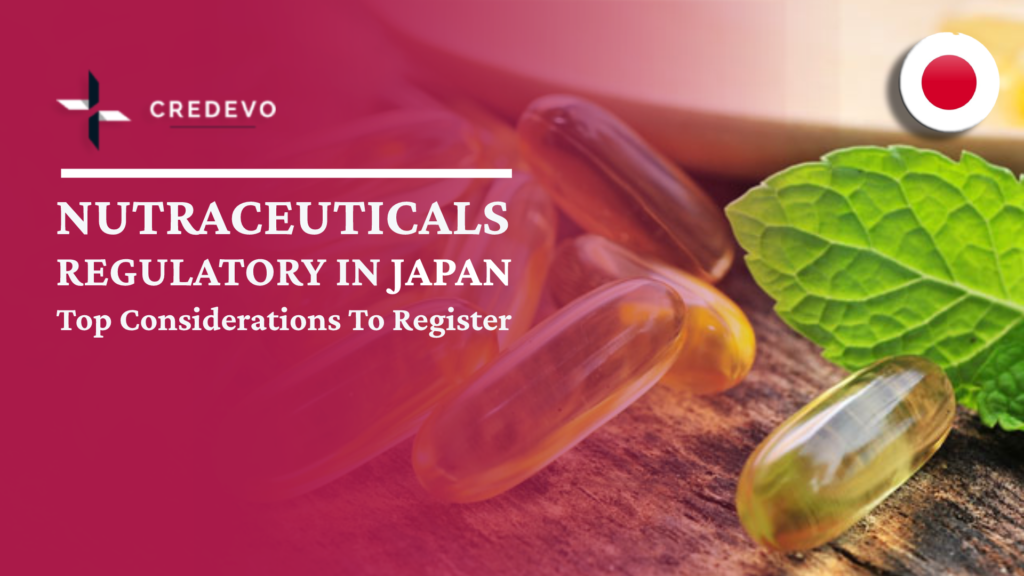Top 4 Considerations For Registering Nutraceuticals (Food Products) In Japan

Japan has the same regulations and practices for nutraceuticals, food, and beverage goods as any other nation. Legitimate safety regulations, regulatory protectionism, and customs taxes present manufacturers with significant obstacles when they attempt to enter the market.

The Ministry of Health, Labour, and Welfare (MHLW) and Consumer Affairs Agency (CAA) are in charge of enforcing the Food Sanitation Act, Food Labelling Act, and Health Promotion Law, which govern food products in Japan. As part of its oversight of food products, the MHLW examines the notification and conducts an inspection.
Primary food packaging with labels in Japanese is a requirement for all goods. Incorrect labeling translations may call for extensive reworks and significant financial loss. The Food Sanitation Act requires importers and manufacturers to submit an import notification to guarantee the safety of imported foods and other related items.
When registering food products or nutraceuticals in Japan, one should consider four crucial aspects.
- Understand the category of your food product
- Follow the fundamental guidelines for Japanese food labeling
- Adhere to measures for packaging
- Import
Let’s discuss each one in detail.
Consideration #1: Understand the category of your nutraceutical product
In Japan, they have a bit of a complicated food classification system which you must understand thoroughly before marketing your food products in Japan. Depending on the classification of your food product, marketing strategies will vary.
In Japan, “foods with health claims” refers to foods that can enhance a person’s physiological functions and have qualities halfway between medicine and some conventional foods. The definition of healthy functional food (FOSHU) includes food with function claims (FFC), food with nutrient function claims (FNFC), and food for specified health uses. The broadest definition of “health foods” includes nutrient-supplementing foods, health supplements, and nutrient-controlling foods.
Consideration #2: Follow the fundamental guidelines for Japanese food & nutraceuticals labeling
The rules for food labeling in Japan are flexible and exceedingly complex, with several overlapping restrictions. Foreign businesses who want to import food into Japan can consult local professionals who can help them better understand the industry norms.
Food products marketed in Japan must have labels written in Japanese. The fundamental requirements state that the product name, ingredients, allergens, additives, net content, best-before or used-by date, storage method, place of origin, and information about the importing firm must all be listed.
Basic food label standards in Japan
- the name of the product
- country of origin
- ingredients and possible allergens
- name and address of the importer
- food additives
- storage instructions
- net content
- nutrition facts
- best-before date
To learn more about the nutraceutical regulatory process in Japan, Click here
Consideration #3: Adhere to measures for packaging of health foods & nutraceuticals
The container packaging recycling law requires businesses to recycle glass, plastic, paper, and polyethylene containers and label the recycling identification logos on retail food and beverage containers and packaging to reduce waste and encourage the reuse of containers and packaging.
From July 1, 2020, all Japanese merchants, including grocery stores and restaurants, will be forced to impose an obligatory levy of at least 1 yen (about $0.01) for each plastic shopping bag to limit the country’s use of plastic.
The ministerial regulation for the Container Packaging Recycling Law (JA2020-0134) outlines the mandatory plastic bag fee for the program under the Ministry of Economy, Trade, and Industry (METI).
Consideration #4: Import of health foods & nutraceuticals into Japan
Get your sample tested
- The importer should deliver the product sample to the MHLW port and Japanese customs. The quarantine station will examine the product to determine if it conforms to the Japanese food sanitation act.
- Products that need inspection will undergo checking at a designated bonded warehouse. Samples will be taken and forwarded for laboratory analysis.
- The product will be allowed entry into Japan once it is examined and found to comply with Japanese food regulations.
Form for import notifications
- According to the Food Sanitation Law, anyone wishing to bring food into Japan must first notify the quarantine station at the proposed port of entry by submitting an import notification.
- This form, which is printable here, contains numerous details about the imported goods, including the manufacturer’s information, ingredients, additives, and other pertinent observations.
- It can be completed in either English or Japanese by importers. They can deliver a hard copy in person at the quarantine station or by mail.
- The MHLW (FAINS) has set up a network system for food import notification and inspection. However, the platform necessitates prior ministry registration.
What additional paperwork is necessary for food imports into Japan?
- Along with the import notification, importers must include a certificate of analysis (COA) from a reputable laboratory in the exporting country.
- All food and beverage goods must have this certificate to enter the market and pass through customs clearance.
- Other supporting documentation regarding the product’s elements, ingredients, and manufacturing processes might also be required, depending on the product classification.
- The authorities frequently request considerable information when importing processed or packaged foods into Japan for the first time.
Conclusion
- The law in Japan that governs the integrity and caliber of food is the Food Sanitation Act. The Food Labelling Act is the primary piece of legislation that oversees food labeling regulations.
- The MHLW may also develop guidelines for the production, processing, use, preparation, or preservation of food or additives, and standards for the ingredients or additives under the FSA. As a result, substances can only be used in circumstances where the specifications and standards permit them.
- The Legislation on the Security, Quality, Efficacy, and Safety of Products, Including Pharmaceuticals and Medical Devices, governs pharmaceuticals and medical devices separately from foods under Japanese law.
- Depending on the classification of the food product, importers must adhere to a separate set of rules and regulations.
Do You Want To Learn More About Nutraceuticals regulations In Japan?
To learn more about nutraceutical regulations or need support in registering your nutraceutical products in Japan And worldwide? Provide the details in the below form to connect with us and explore our regulatory services.